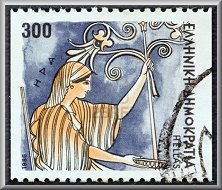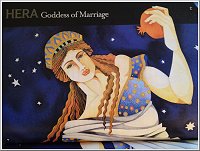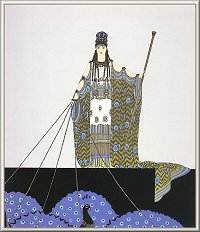
Hera
CLICK
TO ENLARGE

Greek
Hera Stamp
CLICK
TO ENLARGE

Hera
CLICK TO ENLARGE

Hera
CLICK TO ENLARGE

Hera
CLICK TO ENLARGE
|
HERA PAGE ONE
Hera was the daughter of the Titans Cronus and Rhea and was born
either on the island of Samos or at Argos. These two islands
became the chief seats of her worship in ancient Greece, but she
was brought up in Arcadia by Temenus, son of Pelasgus, or,
according to the poet Homer, by the Titans Oceanus and Tethys.
The Seasons were her nurses, which is a way of saying that Hera
was a goddess of the calendar year. She was Zeus’ sister and
equal to him in one thing alone: that she could bestow the gift
of prophecy on anyone she pleased.
Following the Olympians' overthrow of their father Cronus, who
used to swallow his children as they were born, she became the
wife of Zeus. But she didn't do so willingly, and in fact she
rejected his advances when he courted her at Cnossus in Crete,
or on Mount Thornax, since renamed Mount Cuckoo.
Zeus finally resorted to trickery in order to win her over, and
transformed himself into a sad-looking and bedraggled cuckoo,
soaked from a sudden thunderstorm. Hera did not see through his
disguise, took pity on this poor creature and held it in her
bosom to warm it.
Resuming his true shape, Zeus then used the opportunity to
ravish her and in shame she agreed to marry him. The wedding
feast was a huge and momentous bash and all the gods brought
wonderful gifts for the new couple.
In particular, Gaea (Mother Earth) gave Hera a tree with golden
apples, which she placed in her orchard on Mount Atlas. There
the maidens called the Hesperides and the dragon named Ladon
guarded the golden apples, until the great hero Heracles came by
and stole three of them to fulfill one of his labors.
Following her marriage with Zeus, Hera was treated by the other
Olympian gods with the same reverence as her husband.
Zeus himself, according to Homer, listened to her advice, and
shared his secrets with her, rather than to other gods. Hera
also felt justified to censure her husband when he did not
consult with her.
Nonetheless, admittedly she was far inferior to Zeus in stature
and power; Hera knew that she should obey him unconditionally,
and, like the other gods, she is chastised by him when she has
offended the all-powerful king of the Olympians.
Homer describes Hera in rather unflattering terms, painting her
as not very amiable, and giving her a jealous, obstinate and
quarrelsome disposition, and a wife's wrath which sometimes
makes her own husband tremble
Following the wedding party Hera and Zeus spent their honeymoon
on the island of Samos and it lasted three hundred years. To
them were born the gods Ares, Hephaestus and Hebe, even though
some say that Ares and his twin sister Eris (Strife) were
conceived when Hera touched a flower (perhaps the may-blossom),
and Hebe when Hera touched a lettuce.
Some claim that Ilithyia (or Eileithyia), goddess of childbirth,
was her child by Zeus. Even Hephaestus was said to be her son
alone, created when she got angry at Zeus for giving birth alone
to Athena from his head.
In disgust at the sickly and ugly child she had birthed, Hera
flung Hephaestus from Olympus, and he fell for a whole day until
he landed in the sea, where the surf carried him to the island
of Lemnos.
When Hephaestus grew up and was persuaded to return to Mount
Olympus and to regain his rightful place among the gods, he
crafted a mechanical chair with arms that folded and imprisoned
the sitter. Thus trapping his mother, he made her swear an
unbreakable oath by the River Styx that indeed she alone gave
birth to him, and that he had no father.
However, while some claim that Zeus was Hephaestus' father,
others hold that he was Hera's son by Talos, the nephew of the
inventor Daedalus.
Hera's name is usually taken to be a Greek word for 'lady', or
perhaps it derives from the pre-Hellenic Herwa (Protectress).
She was given the nickname "cow-faced" (in some translations
"ox-eyed") which has stuck with her through the ages, but the
Queen of the Olympians was very beautiful.
In fact she was one of the three contestants in the Judgment of
Paris, which was held to identify the most beautiful goddess,
and which led to the Trojan War. (Paris chose Aphrodite after
she promised him the hand of gorgeous Helen, forever incurring
Hera and Athena's wrath.)
But her personality was not as attractive, for she was
frequently petty, cruel and vindictive, and in myths is most
often shown administering some sort of revenge on one of Zeus’
lovers or his illegitimate children.
 CONTINUED ON PAGE TWO
CONTINUED ON PAGE TWO

Hera continues on page two!
Lots more info and pix - Click here!

[home] [page one]
[page two]
|







